




The Financial Reporting Council defines Stewardship as “the responsible allocation, management and oversight of capital to create long-term value for clients and beneficiaries leading to sustainable benefits for the economy, the environment and society”
We are proud to present our annual report in line with the principles of the Stewardship Code 2020.
Our investment objectives are to achieve sufficient investment returns such that there are funds available to pay the pensions as they fall due, and to meet the liabilities over the long term whilst maintaining stable employer contribution rates. As a long-term investor, we recognise the value which can be generated through stewardship activities, both in terms of reducing risk and improving returns.
This mindset is demonstrated by the following investment belief:
Stewardship and engagement are generally more effective tools than divestment in encouraging changes that will help safeguard the Fund’s investments. The Fund values the benefits of working with other investors to strengthen these activities and achieve better outcomes.”
We have long-established activities in this area. This report sets out the principles of the Code and how we comply with these principles, what activities are undertaken in each area, examples of the outcomes that we have achieved, and how things have changed and improved since last year.
A short mini magazine highlights report will be published alongside this full version to help make the information as engaging and understandable as possible for a non-technical audience.
This report was approved by the Wiltshire Pension Fund Committee at its meeting on 28 March 2024, and published shortly thereafter.

Signatories’ purpose, investment beliefs, strategy, and culture enable stewardship that creates long-term value for clients and beneficiaries leading to sustainable benefits for the economy, the environment and society.
Wiltshire Pension Fund is part of the Local Government Pension Scheme (LGPS), a defined benefit pension scheme for local government and associated employees.
Our Purpose
Our purpose as a Fund is to provide pension and lump sum benefits for members on their retirement and/or benefits on death before or after retirement for their dependants. We are funded by employee and employer contributions, and returns from our investment assets.
The objective is that the Fund should be at least 100% funded on an ongoing basis. The projection is that full funding is achieved over a time frame agreed appropriate by the Actuary for each employer, as set out in the Funding Strategy Statement
Our vision is to deliver an outstanding service to our scheme employers and members
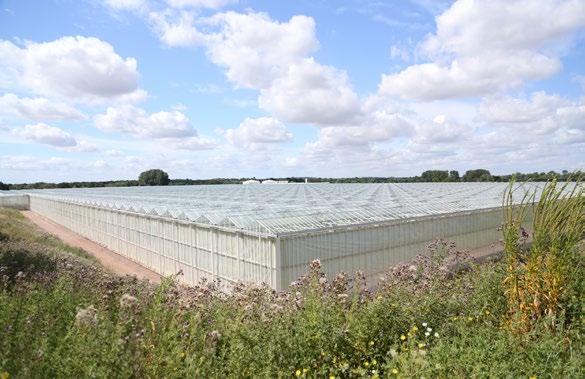
Our vision is set to establish a sense of purpose, and to focus the team on delivering outcomes for the employers and members of the Fund. We measure success against the vision by monitoring our progress against various service related KPIs, targets, and actions. Our vision is supported by our Strategic Vision Goals, which provide a focus to everything we do, and our Values, which define our culture.
The value “Long Term Thinking” runs through everything we do. Wiltshire Pension Fund is a long-term investor, and so is able to participate in stewardship activities which can add value to the Fund’s investments over the long term.
The strategic goal 11, “Responsible Ownership and Stewardship”, is particularly relevant to stewardship activities. The goal focusses on ensuring that our responsible investment and stewardship activities are in line with best practice (which also contributes to strategic goal 16, “Compliance and Best Practice”), and that these activities are a central part of delivering an outstanding service to our scheme employers and members.
For these different groups this may mean different things – employers will be best served by the delivery of long-term positive investment returns, which will help keep their contribution rates affordable (strategic goal 1, “Stable and Affordable Contributions”, is targeting this outcome), and stewardship activities can help preserve capital and enhance value.
Members may be concerned about how the funds held to pay their pensions are invested, and goal 15, “Transparency and Information Sharing” contributes to this outcome. Stewardship has a role to play here in the information that is shared with members – the Fund publishes its engagement and voting records online, and also a magazine version of this report will be published alongside this full version, to help make the information as engaging and understandable as possible for a non-technical audience.
11 Responsible ownership and stewardship 15 Transparency and information sharing
Compliance and best practice 1 Stable and affordable contributions LONG TERM THINKING
We always act with the long term in mind, whether we are setting our investment strategy, planning improvements, or working towards our net zero by 2050 goal
Our investment beliefs help to inform the investment strategy. The full list of beliefs are detailed in the Investment Strategy Statement
Our RI policy (Exciting news – Our 2023 Responsible Investment Policy has been published! – Wiltshire Pension Fund) sets out implications against each RI-related investment belief:
The strategic asset allocation is the key factor in determining the risk and return profile of the Fund’s investments
The Fund has embedded ESG issues and sustainability within the strategic asset allocation and has set specific strategic allocations to Paris-aligned passive equities, sustainable active global equities, renewable infrastructure and climate solutions, and impact affordable housing, in order to manage risk and secure returns into the future.
Investing over the long term provides opportunities to improve returns
Environmental, Social and Governance factors, including Climate Change are important factors for the sustainability of investment returns over the long term
Investing over the long term means that the Fund can take advantage of opportunities in long-term sustainability trends and/or growth style portfolios, as well as benefit from engagement activities with companies in which the Fund is invested.
The Fund’s status as a long-term investor means that the Fund needs to consider the risks and opportunities presented by wider issues such as climate change and the potential impact on the investments. This can help the Fund avoid the risk of being exposed to stranded assets and help ensure that the Fund can benefit from exposure to companies which are well prepared for transition to a low carbon economy.
In order to protect the Fund’s investments into the future, the Fund supports a global warming scenario of well below 2°C, and states an ambition to achieve net-zero carbon emissions across all investment portfolios by 2050
We seek to invest in a way that, where possible, aligns the interests of the Fund with those of the contributing employers and the Fund membership
The Fund acknowledges that climate change is a material systemic risk which could have significant adverse impacts on the investment portfolio if not managed correctly. The Fund is actively working to mitigate this risk, and the Committee has reviewed scenario modelling and undertaken training, and the Fund reports in line with TCFD recommendations, which disclose how the Fund manages climate change risk.
The Responsible Investment policy contains an employer and member engagement plan and is actively advancing the approach in this area. Member and employer views formed part of the decision-making process when setting the net zero target. A recent survey of employers showed that in the majority of responses, employers believe that it is important that the Fund’s investment strategy should, where possible, try to reflect the wider goals and philosophy of the employer organisations. A recent survey of the Fund’s membership showed that from the 2,914 responses, 85% of members answered “Yes” or “Maybe” to the question “Is it important to you that the Fund invests in low carbon and/or sustainable assets?”
Investing with a positive social and environmental impact is an increasingly important issue for investors and can be achieved alongside competitive market returns. Investing with impact can also help incorporate risk and return drivers which would otherwise not be considered. The Fund wishes to invest in a way that minimises negative impacts on society and the environment and, where possible, makes a positive contribution
Stewardship and engagement are generally more effective tools than divestment in encouraging changes that will help safeguard the Fund’s investments. The Fund values the benefits of working with other investors to strengthen these activities and achieve better outcomes.
Impact investing is a rapidly growing area and the Fund has made dedicated strategic allocations to Impact Affordable Housing and Renewable Infrastructure & Climate Solutions.
We are signatories of the 2020 Stewardship Code. We also publish a mini-magazine on our Responsible Investment and Stewardship Highlights each year, designed to make this information accessible to our stakeholders. We continue to work with wider initiatives and fully engage with them.
Source: Wiltshire Pension Fund Investment Strategy Statement
Our RI policy is reviewed and updated annually. The 2023 version includes new areas as follows:
• New targets to help us achieve our goal of net zero across all portfolios by 2050.
• Considerations on how we will approach the important topic of Biodiversity.
• A statement around Equality, Diversity and Inclusion (EDI).
• A bold pledge around divesting from fossil fuel companies.
Annual review of the policy delivers the outcome that we are able to consider emerging subject areas and developments, and ensure that our approach evolves over time. Our fully integrated approach in this area has twice won us the LAPF Investment Award for “Best Approach to Responsible Investment”, in 2021 and again in 2023.
Compliance and best practice
The Committee received training on Climate Opportunities at their meeting in November 2023. This training looked at the Fund’s Climate Opportunities (Clops) portfolio, which is being set up to implement the 7% allocation to renewable infrastructure and climate solutions. The Committee looked at the portfolio’s objective (shown on the right), portfolio construction, manager selection, due diligence and reporting. Through this process we were able to achieve the outcome that the Committee members were comfortable with the level of due diligence that was being carried out, and ask questions of experts regarding issues such as the risk of changes in regulation. The members endorsed the work done to implement the portfolio, demonstrating that the training supported better decision-making.
To earn superior risk-adjusted returns by investing in a diversified mix of assets which have the intention to deliver real World change by actively supporting the transition to a low carbon economy
Our team and our membership – who are we?
The total Wiltshire Pension Fund team headcount of staff is around 40. We have >84,000 members, and c.180 employer organisations.
As the team is relatively small, information that can be published is limited so as preserve the anonymity of individuals, and is only based on team members who were willing to participate. We also share similar high-level information about our membership.
The Pensions Regulator recently published guidance on EDI, explaining why this is an important topic and offering practical ways that pension schemes can improve EDI on the governing body. The guidance recommends training as a first step for governing bodies.
The Local Pension Board and Committee both considered EDI at their meetings in Q3 2023. One outcome from consideration of EDI was that the Committee and Local Pension Board decided to include a specific statement about EDI within the 2023 revision of the Responsible Investment Policy:
The Fund regards EDI as an important ESG factor, a stewardship priority, and an area where investment managers should focus their voting and engagement efforts, as several pieces of research have shown that diverse boards lead to better financial outcomes (for example, this publication by the FRC).
Consideration of EDI is embedded at an operational level, and has been highlighted as an important area in the running of pension funds by the Pensions Regulator. Training will be provided to the full Pension Fund team as well as the Committee and Local Pension Board, in order to improve the way we are run as a fund, and to deliver better outcomes for our employers and members.
We carried out a survey of our membership in January 2024, about responsible investment. One of the questions we asked was for members to select which ESG issues were most important to them (they could select as many as they liked). This was to help inform our engagements and communications. EDI was a top three issue, with 52% of respondents selecting this as an important issue to them.
During the year, both the Local Pension Board and Committee attended a dedicated training day, provided by Aon, on EDI through a pensions lens. Member feedback on the training was that this was a really positive and informative session, and gave them plenty to consider.
The WPF team have also all attended training on “Creating an Inclusive Workplace”. This is important not just for the team to be as inclusive as possible, but also in dealing with members. One outcome of this training was that at a recent team building day, the team set themselves a goal to promote inclusivity in the workplace, as they believed that this was an action that would help lead the Fund to achieve our vision.
To celebrate International Women’s Day in March 2024, we published some interesting membership stats and information about the gender pensions gap, in order to encourage all our members to get involved and engage with their pension. We also featured profiles and achievements from some of the female members of our team. Although we already have a majority of female team members, the goal was to use the powerful tool of representation to encourage women to enter the financial profession. This provided the outcome of feeling valued among the participants.
As a result of a collaborative team exercise, another outcome was that the team designed and adopted new customer service pillars. This included a pillar about treating customers fairly and equally. This has now been included in the latest revision of our customer service policy.
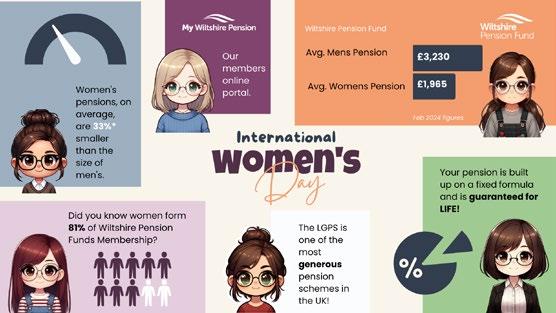
During the year, we launched a survey to engage more with our younger members. This was driven by a commitment to understanding and meeting the expectations of our younger members. By initiating this project, we aimed to create a more inclusive, responsive, and future-oriented pension fund that aligns with the values and priorities of our members. This project was deeply informative. As expected, the response rate was fairly low, but the act of carrying out the survey was a good piece of engagement in itself, by helping to increase the awareness of younger members regarding pensions. The outcome of the survey is that we will be carrying out several follow-on actions:
• We were interested to learn that the younger members thought climate was an important issue, but they thought that equality, diversity and inclusion was even more important, as well as other social issues. We will therefore ensure they are informed of any case studies or engagements we do in this area.
• All respondents felt that it was important for younger people to take an interest in their pension (possibly a self-selecting response).
• There was a lot of confusion around pensions, with several people expressing that it was unclear to them what the benefits were, or the practicalities around joining the scheme. We will therefore be making a short “Pensions 101” video to share with all new joiners to the scheme and will also circulate this to employers so they can use it as part of their induction materials.
• We will be hosting a one-off focus group for younger members in 2024.
The findings of the survey were reported on our website: Engaging with our younger members - Wiltshire Pension Fund.
During the year, we published a news story on the work we have been doing on EDI (Embracing Equality, Diversity and Inclusion (EDI) - Wiltshire Pension Fund). As part of this work, we looked outwards to our investment managers, to gain an understanding of how they are embedding consideration of EDI in their investment approach, with a particular focus on the challenges in emerging markets.
A positive outcome here was that we were able to gain a clear understanding of how the manager was incorporating the 'S' (social) aspect of ESG criteria. This helped us to ensure genuine inclusivity and a strong commitment to diversity and equality, both in the workplace and in their investment decision-making processes.
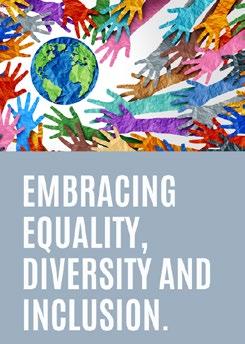
Our Q3 2023 voting summary included voting highlights with a focus on EDI. One example was for Nike, an American athletic footwear and apparel corporation in which we have almost £6m invested through our Brunel portfolio. We are pleased that EOS (who carry out the voting) were able to use the vote to support the introduction of reports on the median gender and racial pay gap, and report on effectiveness of supply chain management on equity. Voting in favour of these reports is thought to promote better management of opportunities and risks. The outcome was that both these shareholder proposals gained significant (although not majority) backing, and although not successful, this did prompt further explanations and a statement from the board. This instance underscores the dual commitment to holding companies accountable while also promoting fairness and responsible business practices. The emphasis on EDI considerations within voting decisions will align our investments not just for financial gain but also for societal impact and ethical progress.

There is a clear thread all the way down from our vision, through our goals and values, to how we operate as a team.Our strong sense of purpose and focus ensures that all our activities are working to deliver against our vision, and ultimately to deliver better outcomes for our beneficiaries.
Signatories’ governance, resources and incentives support stewardship.
Pensions Committee – meets at least eight times a year to review the investment, administration and governance affairs of the Fund, review performance, and plan the implementation of policy.
Local Pension Board – responsible for securing compliance with the Regulations, any other legislation relating to the governance and administration of the Scheme, requirements imposed by the Pensions Regulator and ensuring effectiveness and efficiency.
Both these groups regularly discuss responsible investment and stewardship matters. Being regularly informed delivers the outcome that these groups are aware of the issues and are able to support better decision making, as well as raise relevant issues for consideration.
Relevant roles in our team include a Governance Manager, a Communications and Customer Engagement Manager, and a team of investment and accounting professionals.
The investment team’s responsibilities include development of the Fund’s strategic asset allocation, stewardship and responsible investment issues, selection and monitoring of the Fund’s asset managers, working with the Brunel Pension Partnership pool in setting up portfolios, transitioning assets, representing the Fund’s interests, and holding Brunel to account.
Officers and Managers of the Fund come from a wide range of backgrounds, accountancy, communications, consulting, pension and information systems, bringing a wealth of experience and range of qualifications.
Training needs for officers are assessed as part of setting the workplan for the team and in setting goals and performance targets for individual team members.
Stewardship resourcing – in-house, at the pool, consultancy support and wider initiatives
Work done on responsible investment issues is largely resourced by officer time. Officers have been set responsible investment and stewardship objectives as part of the annual goal setting process, and an assessment of progress against these objectives forms part of the annual appraisal performance review.
As well as the work done in-house, responsible investment work is also carried out by the Brunel pool, which has a dedicated team of staff. This resource is a benefit of pooling, as we can use the scale from working with our partners to make our collective voice heard. We engage with Brunel on responsible investment issues regularly – one of the ways this takes place is through the Responsible Investment Sub-Group, which Wiltshire officers regularly attend and is strongly supportive of stewardship. This group learns about engagement case studies, helps to develop reporting, and sets the responsible investment agenda at the pool in line with client requirements.
The Fund’s investment adviser, Mercer, have allocated a specialist responsible investment adviser to work with the Fund. This continuity of specialism will benefit the Fund as the approach is further developed.
WORKING TOGETHER AS ONE FUND
We work together as One Fund, demonstrating the values of transparency, accountability, ownership, critical thinking, respect and agility
As set out in the Fund’s investment beliefs, the Fund values the benefits of working with other investors to achieve better outcomes. A full list of the initiatives we support is included in our RI Policy. We continuously assess how effective these initiatives are, whether we are using them to our best advantage, and what outcomes they are delivering for us.
Each year we design a new Responsible Investment Plan to set out are areas of focus and development for the coming year. The plan is then reviewed and approved by the Committee. This important piece of work delivers the outcome that we are focussing on key areas. It also holds the team accountable to deliver against the plan, demonstrating a positive way to incentivise the team. As set out in the plan, pieces of work are included based on the following criteria:
i. There are existing commitments to complete the work.
ii. Continuation of existing work
iii. Improving current practices.
iv. Addressing topical issues, which we have identified as priorities due to their impact across our portfolios and/or membership.
This way of working also delivers the outcome that we are constantly pushing ourselves to improve and advance our approach in this area.
Developing carbon metrics, understanding of where emissions are most intense, and how to target reductions and alignment with transition pathways are key parts of our strategy. Mercer’s ACT tool has been a valuable resource for insight into how this looks in practice from bottom-up and top-down viewpoints. This analysis is always evolving, and we collaborate with Mercer on what information will be most valuable to us. For the 2023 report, we requested the inclusion of analysis of which of our equity holdings met our definition of “fossil fuels”. An outcome from receiving this new analysis is that we have now launched a new piece of work to review each of these companies to ensure that it is on a path to transition, and we will be publicly reporting on this work, in the interests of transparency and information sharing.
Transparency and information sharing
By making efficient use of resources, we are able to use third party data and advice to supplement our own expertise, and focus our efforts on priority areas. Our ways of working ensure that we are on the front foot and promote a culture of continuous improvement. This approach enables us to stay agile and react to emerging issues.
Signatories manage conflicts of interest to put the best interests of clients and beneficiaries first.
The Public Service Pensions Act 2013 defines a conflict of interest in relation to a person, as “a financial or other interest which is likely to prejudice the person’s exercise of functions as a member of the board (but does not include a financial or other interest arising merely by virtue of membership of the scheme or any connected scheme).”
Due to the nature of the LGPS (as a funded statutory scheme, without the same separation that would exist in a trust-based arrangement) there is a possibility that potential conflict between the Fund and the Council could occur if interests were not managed appropriately.
As Administering Authority, Wiltshire Council requires that all Councillors and co-opted members of Wiltshire Council must register disclosable pecuniary interests for public view.
All members of the Pension Fund Committee and Local Pension Board’s declared interests, including any that may affect the stewardship of the Fund’s investments,
are maintained, and monitored on a Register of Member Interests. These are kept up to date and published on the Council’s website under each member’s name and profile:
• Committee details – Wiltshire Pension Fund Committee | Wiltshire Council
• Committee details – Local Pension Board | Wiltshire Council
• The Local Pension Board has its own Code of Conduct and Conflict of Interest Policy Guidelines.
Each member of the Pension Fund Committee is required to declare their interests at each meeting. No declarations were made during the year 2023/2024.
Brunel maintain a ‘Disclosure of conflicts of interest log’ which is presented to Client Group. The log of disclosures lists any interest that could potentially present a conflict, this is also monitored by internal compliance in Brunel.
We have made an allocation of 5% of the Fund to impact affordable housing. During a review of this portfolio in late 2023, Committee members spotted a local development within the portfolio that is also part of a Council project, and were quick to enquire whether this represented a conflict of interest. The development is held within a pooled property fund which is managed by a third-party manager, who are set both financial and impact performance targets. Therefore, the Committee were able to gain assurance that this development had been independently selected and that governance arrangements were appropriately separated from the Council, and that therefore no conflict existed.
During the year, the Committee debated the concept of divesting from fossil fuels and agreed a plan for divestment. In this discussion a potential conflict of interest was flagged between the Fund’s net zero target (set in the Fund’s best financial interests) and the fact that the Fund still has a small number of fossil fuel holdings, which have been selected by the Fund’s investment managers as part of a balanced portfolio. Wording was added to the Responsible Investment Policy to provide context to the divestment statement which was agreed by the Committee:
The Fund holds the following investment belief:
In order to protect the Fund’s investments into the future, the Fund supports a global warming scenario of well below 2°C, and states an ambition to achieve net-zero carbon emissions across all investment portfolios by 2050
The divestment plan acknowledges this potential conflict and aims to divest in a managed way by 2030.In the meantime, all fossil fuel investments will be monitored to ensure that they are delivering real world change, and investment managers will be challenged on their holdings.
The Fund still holds a small amount of investments in fossil fuel companies, which we acknowledge could be seen to be in conflict with this belief, and could even be interpreted as potentially supporting the very scenario we are trying to avoid, which would be financially detrimental to the Fund, and therefore incompatible with the fiduciary duty to our beneficiaries.
By embedding consideration of conflicts at both a decision-making an operational level, we are able to maintain high standards and ensure that conflicts of interest are appropriately managed and do not negatively impact on stewardship activities.
Signatories identify and respond to market-wide and systemic risks to promote a well-functioning financial system.
Our framework for risk management has undergone a huge revamp over the last two years, with the new risk and control register being thoroughly embedded in ways of working, and continued meetings of the CROC working group (Compliance, Risk, and Operational Controls). The new risk register contains tabs for each area, with ownership assigned to a manager within the team. Controls are linked to specific risks, and need to be evidenced. Managers review and update their risks and control dashboards every month, and engage in challenging monthly meetings. An outcome of this new way of working has been to promote ownership of risk, and has embedded a “whole Fund” approach to risk management.
The Local Pension Board and Committee continue to review the risk register on a quarterly basis, and the Local Pension Board highlight areas of importance to the Committee for their particular attention. A positive outcome from this regular review is that the Committee are highly aware of the “high” risks facing the Fund, and this enables more effective decision making.
A full commentary on risk identification and response specifically as it relates to investments, is given in the Investment Strategy Statement (ISS).
The following summary highlights key risks from our risk and control register which address market-wide and systemic risks, and explains how the risk has evolved over the year and what actions have been taken as a result of regular review and oversight.
Strategic asset allocation
The fund fails to implement the optimum risk / return strategy as set out in the ISS, with assets falling outside of their permitted allocation ranges
13 Robust processes, controls and risk management
Due to market movements, which vary between asset classes, the portfolios can move out of their permitted ranges.
A monthly review assesses the position, alongside thoughtful consideration of upcoming changes. An outcome of this work has been that proper planning for implementation of the Clops (climate opportunities) portfolio being tied in with redemption of an interim listed infrastructure portfolio to fund the changes.
Investment performance
Investment performance by managers is poor or misaligned with expectations leading to risk of funding level, achievement of investment strategy and poor benchmarking
Investment governance
Internal controls of investment managers and custodian
Climate change risk
Lack of compliance with legislation, LGPS 2016 regulations, MIFID 2, CMA order, Stewardship code, TCFD, Pooling guidance, etc.
Performance is reviewed monthly and then (unless anything urgent is identified) in detail quarterly with investment managers. During the year we experienced underperformance from our sustainable equities portfolio, but an outcome from regular review was that we were assured that this was due to extreme market events such as the ongoing Ukraine conflict, and therefore performance was not out of line with expectations.
Multiple workstreams during the year tackled this risk, including publication of the Fund’s Stewardship Report and minimagazine, and Climate Report. We worked collaboratively with the Committee to form a consensus of views for our response to the Government’s pooling consultation in autumn 2023.
Responsible investment and stewardship strategy achievements
Poor controls by investment managers and custodian could lead to loss of assets.
Climate risk is arguably the most significant financial risk facing the Fund. Failure to manage the risks in the investment portfolios, and/or to take advantage of the investment opportunities which arise from transition to a low carbon economy could cause the Fund to suffer material negative financial impacts.
The fund fails to meet its RI objectives, including climate.
We have received and reviewed all control reports, and through this process have gained assurance that this risk is well managed.
We have approached this risk from both a risk mitigation perspective, and to ensure there are no lost opportunity costs. We have launched our Clops (climate opportunities) portfolio this year and set new climaterelated targets. For outcomes, please refer to the deep dive case study below.
Our responsible investment plan has kept us on track and led to exciting outcomes such as the younger members engagement project (covered elsewhere in this report), and the publication of our first ever Affordable Housing Impact Report.
Funding
There is a risk that failure to consider the multiple factors affecting the Fund's funding position could lead to adverse outcomes for the Fund, including lack of awareness around the impact of macroeconomic events on the Funding position, failure to act in a timely manner in response to significant falls (>20%) in the funding level, or failure to proactively address employer cessation and solvency issues.
The cost-of-living crisis could impact the Fund from numerous perspectives (funding, investments, comms, admin, cash flow, resourcing etc). There is a risk that is this is not properly considered and acted on, the Fund could experience adverse outcomes.
The funding position is at a high level. We have experienced investment underperformance over the year, but due to rising gilt yields, our discount rate has risen, and the present value of our liabilities has fallen. For outcomes, please refer to the case study below for more detail.
For outcomes, please refer to deep dive case study below.
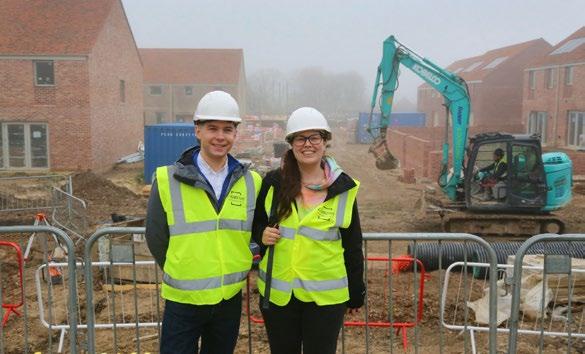
In December 2022, we published an in-depth analysis of the cost-of-living crisis, and the potential risks to all areas of the Fund and our membership: The cost-of-living crisis, and the impact on WPF – Wiltshire Pension Fund
Throughout the year, we have maintained this risk on our risk register, and continue to consider and review it monthly. The following two pieces of work evidence that we have adopted a fully integrated “One Fund” approach to managing this risk.
One risk arising from the cost-of-living crisis is that with benefits rising with high inflation, but salary increases (and the corresponding pension contributions) not keeping pace, could the Fund suffer cashflow issues?
Our modelling concluded that this was not something we needed to worry about in the short-term, but this is an area where we need to be able to operate sustainably going forward. Our SALAMI (strategic allocation to liquid asset-matching investments) portfolio enables us to hold funds in EFTs (exchange-traded funds) which broadly match the overall strategic asset allocation of the Fund, but with daily liquidity. This has meant that we have been able to top this portfolio up as part of monthly rebalancing work, and then easily withdraw money as needed for investment purposes.
The outcome of this portfolio has been to improve liquidity without sacrificing returns, reducing the risk that we may need to sell investments at inconvenient times.
For PAW this year (Pension Awareness Week – 11–15 September 2023 –Wiltshire Pension Fund), we wanted to support our members to understand their pension and provide them with useful tools and information to enable them to plan their financial future. Over the week we sent out a series of factsheets to our members, covering topics such as basics about the Fund and how their pension is paid for, financial tools, information about scams, and highlights on how their pension is making a difference, to promote a feeling of pride in being a member of the scheme. In a tough financial landscape, there is a risk that we may see more members opting out of the scheme, and we believe that a better understanding of the benefits will support members in making the best decision for their personal circumstances.
The outcome from PAW was that we achieved a wide reach with our messaging, seeing c.65k emails opened, and c.115% increase in website traffic across the week.
We work together as One Fund, demonstrating the values of transparency, accountability, ownership, critical thinking, respect and agility
10
Strong, risk-adjusted returns
8
Members understand their benefits
Our funding level rose to a high of 136% during the year to 31 March 2024. This was driven almost entirely by gilt yields rising, which meant that the discount rate also rose. This reduced the present value of the liabilities and pushed up the funding level. We closely monitor the funding level as we are concerned about the risk of this falling, but ironically the rise in the funding level presented new risks. Specifically, this introduced the risk that pressure and misunderstanding from employers might lead to demands that contribution rates are reduced or even for a contributions holiday. We held an employer forum in November 2023, and part of the messaging for employers was an educational session on the funding level. We shared the following messages:
Stable and affordable contributions
• The funding level looks really good – but this movement has been driven primarily by gilt yields – it’s been a weird year!
• If inflation is reduced to the long-term target of 2%, gilt yields will reduce.
• If gilts yields reduce, then so does the funding level.
• Therefore, it would be very unwise to make any changes at the current time.
• In addition, the funding level assumes that we continue to invest in the same way as we currently do. If we moved some of our investments to less risky assets (i.e. away from equities and put more in gilts), then the funding level would immediately drop, as the future investment returns would be projected to be lower.
• In short – things look good, but we won’t be making any changes in the short term.
The positivee outcome from this session was that employers understood the current position and supported the Fund in not making any snap decisions.
Our approach to managing climate risk, arguably the biggest financial risk facing the Fund, is that we consider many different angles. The following examples show the way that we are tackling this risk, leaving no stone unturned in our work.
During the year, we set two new climate targets. These are as follows:
• We commit to all of our property investments being aligned with a net zero by 2050 target by 2030.
• We commit to engaging with our top 10 emitters and reporting transparently on our findings.
Our net zero by 2050 target, set following extensive modelling and stakeholder engagement work in the Fund’s best financial interests, covers all asset classes. We assess that property is a high risk area, but it has taken time and consideration to set a target for this asset class, due to lack of data availability. This year we decided on a target which we can accurately measure. The outcome of this target is that we are more aware of which managers are aligned to our approach, and this will reduce the risks of financial loss from physical risks.
The outcome of setting the engagement target is that we have been able to identify and engage on our Top 10 Emitters (Engaging with our Top Emitters – Wiltshire Pension Fund). This work covered c.40% of the emissions in our active equity portfolios!
During the year we began work to implement our strategic allocation of 7% of the Fund to renewable infrastructure and climate solutions. The key outcome here is that this portfolio helps to manage the risk that we miss out on the opportunities presented by transition, as a key aim of the portfolio is to generate competitive financial returns. But it also helps us to help drive the transition by directly investing in solutions, thereby reducing the risk that as a World we end up in an unmanageable warming scenario, which would itself be financial damaging for the Fund, as indicated by the climate scenario modelling.

The research shows that we will not achieve net zero without nature-based solutions. In our 2023 RI Policy, we included a framework for biodiversity risk, as follows:
• We are developing our use of frameworks such as TNFD to support us in our understanding of this area
• We are working with the Brunel pool and our legacy managers to understand where we are exposed
• Our strategic allocation to renewable infrastructure and climate solutions has the scope to contain nature-related investments, providing the opportunity to earn competitive financial returns whilst also delivering positive impacts to nature
• We are focusing on the high-impact sectors of agriculture, food & drink and construction in terms of our current holdings
• Our stewardship efforts will focus on the 5 main drivers of biodiversity loss
This delivers the outcome that we now have a framework to approach this large and not-yet-wellunderstood risk, which will promote better outcomes for the Fund in the future.
Climate Action 100 is an investor-led initiative to ensure the world’s largest corporate greenhouse gas emitters take necessary action on climate change. This initiative enables us to access information on key companies. We use this data when assessing our exposure to climate risk, in order to identify which companies we need to focus on.
We also support the Transition Pathway Initiative (TPI), which is a is a global, asset-owner led initiative which assesses companies' preparedness for the transition to a low carbon economy. The TPI tool assesses progress against companies and sectors to measure the level management quality and carbon performance, to aid in risk assessment.
An outcome from using these initiatives is that we were able to use this data to help identify our Top 10 Emitters, and therefore see where we are most exposed, and use this information to conduct targeted engagement activities. We reported on this work on our news pages: Engaging with our Top Emitters – Wiltshire Pension Fund
We maintain focus on our core objectives, and work in a proactive and disciplined way, to promote simplicity and efficiency in everything we do
Our fully embedded approach to risk management means that at all levels, from our Committee to our team, we understand our risks and are responsive to them. This supports our Committee in better decision making, and empowers our team to take ownership of risks. Throughout the year this has lead to a One Fund approach, where we have considered risks (and developed solutions) from multiple different angles.
Signatories review their policies, assure their processes and assess the effectiveness of their activities.
Relevant policies here include the following, all of which are approved by the Committee:
• Funding Strategy Statement – reviewed every three years as part of the actuarial valuation, with external support and review from the Fund’s actuary.
• Investment Strategy Statement – as above, with ad hoc amendments made as required, with external support and review from the Fund’s investment consultant.
• Responsible Investment Policy – reviewed and updated annually, incorporating information and guidance from the Fund’s investment consultant, as well as thoroughly researched content from the internal investment team, and incorporating wider stakeholder views.
• Stewardship Report – reviewed and updated annually by the Fund’s internal investment team, following feedback on the previous year’s submission from the FRC.
The annual review cycle illustrated below enables actions to be set in the RI Plan, which can then be investigated and incorporated into the next revision of the RI Policy. The Committee discusses progress against the Plan every quarter, which holds everyone accountable to completing actions and making progress towards ensuring the approach is up-to-date and taking account of all new information in the wider industry. This also embeds a continuous assessment of how effective our approach has been, with a quarterly recommendation to our Committee to discuss whether any new actions need to be added to our Plan.
QUARTERLY Review of progress against actions
QUARTERLY Review of progress against actions
Our investment consultant, Mercer, have allocated a dedicated responsible investment consultant to our account. This oversight provides assurance around the robustness and appropriateness of our approach. We also reflect on the feedback provided by the FRC each year on our stewardship submission and update the following year’s report accordingly. We also rely on in-house expertise from our investment team and peer group comparisons. The outcome of this well-rounded process is that we have sufficient broad knowledge to be assured that our approach is proportionate and ambitious.
In order to make sure that the work we are doing is progressive and effective, we need our team to be well informed, highly skilled, and collaborative. The team is small, so we regularly take advice and work with our consultants and advisers. We collaborate with other LGPS funds to share knowledge and best practice. An important assessment criterion for team members is taking ownership for their own professional development. Members of the team have achieved industry qualifications such as the CFA UK’s Investment Management Certificate, and ESG Certificate. Training is obtained through many different sources, including (but not limited to):
• Industry events (conferences, webinars etc).
• Research.
• Information provided through the various initiatives we are members of.
• Publications.
• Deep dives with investment managers.
• Investment site visits.
• On-the-job learning.
The outcome of this drive for excellence is that we are able to carry out quality research into our investments, and produce a variety of case studies and news stories to share with our stakeholders.
We promote an inclusive team culture, and ideas and suggestions for improvements are welcome from any member of the team.
We aspire to be role models and leaders, through our commitment to develop knowledge and training
By regularly reviewing our policies, and incorporating input from specialist advisers, qualified members of the team, stakeholder views, and wider review of peers, we are able to ensure that our policies are up-to-date, and that we are considering all relevant issues. Quarterly review of progress by our Committee ensures that we are held to account, assessing our effectiveness and are constantly evolving our approach. Our inclusive team culture means that ideas for development and/or stewardship actions are welcomed from everyone, and this diversity of thought leads to better decision making.
Signatories take account of client and beneficiary needs and communicate the activities and outcomes of their stewardship and investment to them.
Our beneficiaries
As covered under Principle 1, WPF is part of the LGPS, a defined benefit pension scheme. We are responsible for the pension of c.86,000 members across c.180 employers. Total membership of the Fund as at 31 March 2024 was 85,739 (24,569 active members, 39,041 members with deferred benefits, and 22,129 pensioner members).
What we invest in
The Fund maintains a ~£3.0bn portfolio of assets, managed by a range of managers across diversified asset classes and geography. Full information can be found in the Annual report and accounts
Our time horizon is modelled as part of the triennial actuarial valuation process. Our projected cashflow stretches over 100 years. In practice, with the scheme open to new entrants and future accrual, this time horizon will continue into perpetuity.
How we consider what our beneficiaries need
1 Stable and affordable contributions
4 Employers are advocates for the scheme
8
Our Strategic Goals help us to focus on what we need to do to achieve our Vision. Through our stewardship activities, we focus mainly on the goals highlighted above. We want to ensure that our investment strategy is designed to deliver stable and affordable contributions for our employers, and through stewardship activities we can protect against risk and deliver better risk-adjusted returns, which supports this goal. We also want to provide our employers with the information and tools they need to act as advocates for the scheme, which will deliver better outcomes for our members. Our members need to understand their benefits, and also how the money held to fund their pensions is invested. This will help deliver a positive impact to our members, supporting their financial future and delivering what they need at significant moments in their lives. Our goal of transparency and information sharing further supports us in achieving these desired outcomes
We always act with the long term in mind, whether we are setting our investment strategy, planning improvements, or working towards our net zero by 2050 goal
12
15
We communicate with all our stakeholders in a clear, concise, relevant and effective way

In order to check-in with our members and employers and find out what information is going to support them the best, we have to ask them. We have carried out various surveys of both our membership and employers to ask these questions. In these surveys we ask:
• What issues are important?
• What topics are most interesting and useful?
• How do they want to receive information?
• What can we do to support them?
WE ASK What do our members and employers think?
WE ASSESS Are we being effective and delivering the desired outcomes?
WE LISTEN what do they want to know about, and how do they want to receive information?
WE RESPOND What can we do to provide our members and employers with what they need? want to receive information?
We analyse the information received and put together an action plan. Then, once the actions have been carried out, we assess how effective this has been – this could be via direct requests for feedback, or through reviewing data (email opens, clicks, web visits, self-service portal logins etc). This feedback and/or data will help inform our approach going forward.
Full information on our youth engagement project can be found in the EDI “deep dive” under Principle 1. It is worth another brief mention here, as this project illustrates how we are embedding consideration about our investment timeline in stakeholder engagement. We recognise the importance of engaging with our future pensioners to better understand their expectations, preferences, and priorities regarding their pensions and how it is invested, whilst also keeping them well informed of their benefits. As we are an open scheme we have a constant influx of new joiners, therefore we need to be mindful of how we keep our members well-informed about their pension benefits and our investment rationale. We are aware that young people are typically less likely to engage with their pension. As a Fund we want to engage with all our members about their LGPS pensions, ensuring there are appropriate materials and support for them through their pension journey with us.
During November 2023 we held our first post-pandemic in-person forum for our scheme employers. We covered the following topics:
• What's new in the World of Pensions?
• Guest Speaker (from the Pensions Regulator)
• Investments – why they matter to you and how you can get involved
• Employer Responsibilities and Discretions
• What is Pensionable Pay?
• Communicating Pensions- unveiling the benefits
• McCloudy with a chance of rain
• Meet your Employer Rep and find out how you can get involved
All sessions were tailored to deliver the outcome that employers received information that was directly relevant to them and had actions to take away. There was strong attendance at the forum, with 31 attendees and 18 employers represented. We carried out a feedback survey after the event and received helpful information to help us make future events even more useful.
A specific stewardship outcome was that employers engaged with a session on investments which included information and case studies on our approach to responsible investment. They took away a clear, strong message about how the work we do benefits them by delivering stable returns, and how our responsible investment and stewardship work is in line with our fiduciary duty.
Members understand their benefits
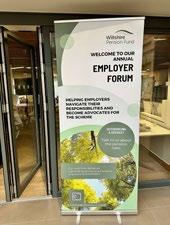
An excellent day with relevant and engaging sessions. Really enjoyed it and found it very useful. Good to network with the pensions team and discuss points of interest and meet other employer colleagues
Different members and employers may wish to receive information in different ways. Our surveys have indicated that both these groups have a strong preference for short communications via email which they can digest in their own time, as well as information on the web. This is therefore how we focus the bulk of our communications. During the year, we published the following documents:




As well as the in-person employer forum we also hosted member webinars, published many news stories, increased our presence on LinkedIn, participated in industry events, and used several different methods to engage with members and employers (emails, videos, website updates etc).
During Pension Awareness Week (PAW) 2023 ºwe created five factsheets for our members, which were circulated during a week long campaign across different digital platforms. The campaign’s aim was to highlight the benefits of the LGPS to members, signpost them to tools and resources to support them in their pension journey and shine a spotlight on the positive impact their pensions are making through responsible investing.
As an outcome, the campaign saw an increase of 5.9% in email open rates compared to 2022, with around 65,000 opened out of the circa 119,000 which were sent out. Data from Google Analytics shows activity more than doubled across the week, on My Wiltshire Pension and wiltshirepensionfund.org.uk.

Our member webinars are also proving to be extremely successful, after a drop in interest, we changed the messaging to “Your pension is calling, pick up the phone“ we had a fantastic 160 registrations. This outcome was an increase of 135 registrations from the previous one.
Feedback from attendees has been extremely positive. Clearly explained, thank you
In January 2024, we conducted a survey of the scheme membership on responsible investment issues. This survey was launched for three main reasons:
1. Engagement with the scheme membership, to raise awareness and to continue the dialogue. Although members’ benefits are guaranteed, and therefore unaffected by investment returns, they may still have opinions on how the investments are managed.
2. So that the results could be considered by the Pension Fund Committee alongside other important information when deciding the direction of travel for the Fund, in the context of setting the Fund’s Responsible Investment Plan.
3. To check in with the membership, after the last survey which was conducted in March 2021, to ensure that members voices are heard and to monitor how member views are evolving.
We were blown away by how much our members care about responsible investment. We received a staggering 2,914 responses, 30% more than in 2021. We saw the highest response rates from pensioner members, and a very low number of responses from members under 30, justifying our continued efforts to engage with this demographic.
We learned that although members are unsure about whether ESG issues present a financial risk to the Fund’s investments, it is still important to them that we invest in sustainable and/or low carbon assets, with 85% answering yes or maybe to this question.
Do you believe that ESG issues present a financial risk to the Pension Fund's investments
Do you believe that climate change in particular presents a financial risk to the Pension Fund's investments Is it important to you for Wiltshire Pension Fund to invest in sustainable and/or low carbon assets?
Are you aware that Wiltshire Pension Fund has a net zero by 2050 target?
Our members overwhelmingly (63%) want us to prioritise investment returns and ESG issues equally. This indicates that members want us to earn strong investment returns, by investing responsibly and in a sustainable way. We are pleased that this is completely aligned with our existing approach. They also value stewardship activities – it was “important” to them that we work to influence the behaviour of the wider financial community and the companies in which we invest, to bring about better environmental and social outcomes.
We asked members to select which ESG issues were most important to them (they could select as many as they liked).
Biodiversity
Executive pay and how companies are run
Equality, diversity and inclusion
Technology
Social issues
Labour practices
None
These findings will help inform our engagement and communication approach, so that we can keep members informed about issues that are important to them. Perhaps unsurprisingly, climate was the top issue, selected by 74% of members, with social issues (53%) and equality, diversity and inclusion (52%) in second and third place. As a result of these findings, we will:
• Continue to work to enhance our climate reporting, and in 2024 will look to expand this to include reporting on biodiversity and nature.
• Publish a short report on the “S” in ESG, in order to update members on the work we are doing in this area, and to demonstrate that this is done to protect and enhance the Fund’s investments.
We asked about the effectiveness of our comms and found that 34% of respondents had seen our Annual Report, a significant increase from 13% in 2021. Of the 46% of respondents who had seen our news pages, 96% reported that they found the content useful/somewhat useful. These findings have given us a steer that we should continue to investigate how we can communicate to our members to highlight key publications, whilst also being respectful of the fact that members will not wish to be bombarded with excessive amounts of information.
We are very grateful to our members for engaging with us in this way and providing us with valuable insights into their views and preferences. The outcome of this exercise has been to raise awareness of these issues among the members, and to provide us with information that we can use to help inform our responsible investment plans, engagement topics, and communications.
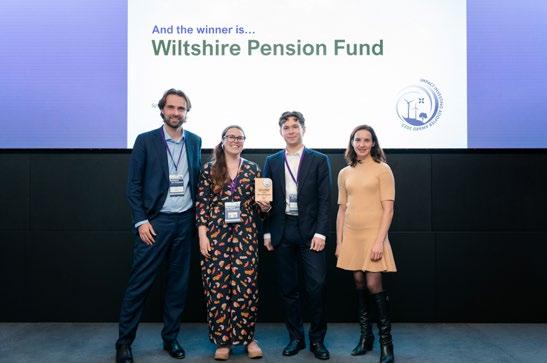
In late 2023, we were delighted to be awarded “Best Climate Change Member Communication” at the Pension for Purpose stakeholder event and awards. This award was for our Purposeful Pensions film. We are passionate about transparency and information sharing with our members, not only ensuring they understand their benefits but are also aware of the positive impact their pension is making. We loved visiting some of our investments during the making of the film, and taking the time to not just tell but actively show our members what our approach to investing looks like.
Through a programme of engagement, we understand what our members and employers want to know, what is important to them, and how they want to receive information. We are responsive to feedback and work creatively to communicate stewardship and responsible investment activities and outcomes in effective ways. We have received industry recognition for our communications efforts.
Signatories systematically integrate stewardship and investment, including material environmental, social and governance issues, and climate change, to fulfil their responsibilities.
We are constantly evolving our approach to responsible investment and have set ourselves a goal to be an example of best practice in this area.
Our dedicated Responsible Investment Policy, updated annually, brings all information on the Fund’s responsible investment activities into one place and to promote transparency and engagement with stakeholders. This includes our climate change action plan.
We integrate responsible investment issues across the whole investment process:
i. Investment Strategy Statement (ISS)
ii. Strategic Asset Allocation (SAA)
iii. Monitoring of managers and the pooling company
iv. Stewardship and engagement
v. Internal reporting and accountability
vi. Reporting externally
vii. Stakeholder engagement
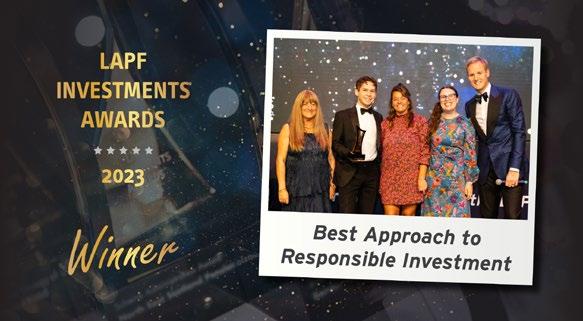
At the LAPF Investment Awards in September 2023, we were delighted to be awarded “Best Approach to Responsible Investment”. The judges’ comments highlighted our fully integrated approach as a key reason for our win.
We believe that the best approach is to focus on priority ESG issues, since research has shown that this can generate the largest positive contribution to returns and is also a practical approach considering resource limitations. The Committee has used the United Nations Sustainable Development Goals (UN SDGs) as a framework to prioritise issues for engagement activity. This prioritisation was assessed through a series of workshops supported by Pensions for Purpose, and subsequent debate at a Committee meeting. Issues for priority engagement are as follows:
• Climate (SDGs 13 Climate Action & 7 Affordable and Clean Energy)
• Economic growth (SDGs 8 Decent Work and Economic Growth & 9 Industry Innovation and Infrastructure)
• Education (SDG 4 Quality Education)
As well as working with the Committee, we always focus on which stewardship priorities will have the biggest impact on our returns, bearing in mind our long-term investment horizon and the opportunity to enact change over a longer timeframe. We look to a variety of sources to form this view. These sources could include industry research, the largest financial risks as identified by the World Economic Forum, our own climate scenario modelling, consultant views, and many more. We also ask our members and employers what their priorities are – this by itself would not be enough to set a new priority, but it certainly delivers the outcome that we ensure we communicate with members and employers about issues that are of most interest to them.
Another way to summarise our priorities is through an ESG lens:
E = ENVIRONMENTAL
• Climate
• Biodiversity
S = SOCIAL
• Affordable housing
• Labour practices
• Equality, diversity and inclusion
• Education
• Health
• Technology & AI
G = GOVERNANCE
• Strong corporate governance
• Executive remuneration and alignment of interest
We communicate our priorities to our managers every year, through circulation of our Responsible Investment Policy, and we specifically ask our managers to acknowledge our Policy and confirm to us that they will invest in line with it. When selecting new managers, being able to align with our RI Policy is one of the key hurdles that must be passed in order for a manager to be investable. This delivers the outcome that our managers are aligned to our approach
The graph shows a very high-level indication of the split of our investment portfolios by geography. Although geography does have an impact (such as the level of risks or data availability for certain ESG factors), asset class is a larger determinant of how we adapt our approach to stewardship and engagement. Brunel's Stewardship Policy outlines the integration across all asset classes in more detail. An example of how we have considered our longterm investment horizon in our approach is our philosophy on emerging markets – we believe it is better to remain invested and earn strong returns by helping to drive real World change, rather than divest and see an immediate benefit to our carbon footprint.

Our plan is to expand climate target setting across all asset classes, but for now data availability is a big challenge for some asset classes. In the meantime, we engage across all asset classes and assess how each of our portfolios is doing.
The following table shows our assessment of our entire strategic asset allocation against various climate criteriaThis shows that, as expected, we are making strong progress in our equity portfolios, and that there are still challenges with data availability in private markets. We are working with all our managers to drive forward improvements.
Global High Alpha Equity (Active)
Global Sustainable Equity (Active)
Private Equity
Emerging Markets Equity
Multi Asset Credit
Private Lending/Debt
Emerging Markets Debt
Infrastructure (Unlisted)
Private Infrastructure
Infrastructure (Listed)
Secured Income –Long Lease Property
Impact Affordable Housing Property
Secured Income –Operational Renewables
Gilts
Bank loans
Fully delivering against the Fund's climate objectives
Significant progress needed by way of target setting, metrics and/or coverage, but no causes for concern
Very good progress made towards target setting/ reporting and mettics/ high level of coverage
Actively causing problems for the Fund's climate objectives
Strong foundations, working towards formal targets/ metrics in development/ coverage improving
Not available
This work has delivered the outcome that we are aware of the limitations across different asset classes and are able to focus our efforts on the key things that need to be progressed in order get to our long-term goal.
We began our collaboration work to set net zero targets with Ninety One, who manage our EMMA portfolio, in February 2022. We then held further strategy evolution workshops in July and October 2022. These workshops involved looking at investment processes, scorecards, target setting and reporting.
The EMMA strategy includes equities and debt, in a roughly 50:50 split, as well as additional “tilts” to the portfolio, which are smaller exposures to certain themes. The outcome of this project was to agree the targets below.
We were delighted to collaborate with Ninety One on this review of the portfolio’s objectives, and found that the strong challenge provided by ourselves, combined with Ninety One’s deep knowledge of emerging markets has led us to a pragmatic but suitably ambitious outcome
1. Investing with the aim of achieving emissions reductions (in the portfolio) consistent with the goal of global net zero emissions by 2050, and a fair share science-based pathway for emerging markets.
2. 75% of equity holdings (by emissions) to have a science-based commitments by 2030.
3. Engage on the portfolios highest emitters (equities), accounting for 65% of total emissions.
4. At least 80% of sovereign bonds to be classified as either “very high alignment” or “high alignment” categories of the Net Zero Sovereign Index by 2030 (with no exposure to Sovereigns in the lowest two Net Zero Index Categories).
5. A minimum 10% exposure to sustainable investments by the end of 2023, rising to 15% beyond.
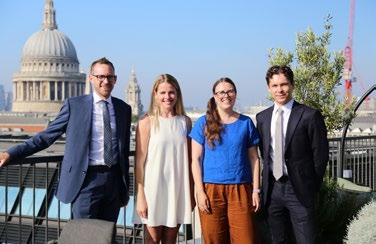
Our approach to stewardship and responsible investment is fully integrated, and this enables us to apply our priorities across all asset classes and geographies, adapting our approach as appropriate. Our stewardship priorities and activities are clearly aligned to our fiduciary duty and vision, and we use our long-term investment horizon to enact these priorities and deliver positive outcomes for our beneficiaries.
Signatories monitor and hold to account managers and/or service providers.
We hold quarterly meetings with our asset managers (including the Brunel pool), and the Pension Fund Committee meet with each manager at least annually on a rota basis, during which responsible investment matters are discussed.
How do we hold our managers to account?
We monitor financial performance, but more importantly we are concerned that a portfolio is performing in the way we would expect given the manager’s established strategy and what has been going on in the relevant markets. We also need to understand what stewardship work managers have been carrying out on our behalf, and how well they are responding to topical issues and current events. As well as the regular review meetings, we carry out ad hoc pieces of work to gain assurance that managers are properly stewarding our assets and acting in line with their mandates. This can involve activities like researching case studies or conducting site visits (please see case studies below). An additional positive outcome from this work is that we can write up our findings and share them with our stakeholders to help bring our investments to life.
Investment Consultant monitoring
In line with the CMA Order (Investment Consultancy and Fiduciary Management Market Investigation Order 2019) we set our investment consultants objectives, and conduct an annual appraisal against these objectives.

The World Economic Forum has identified adverse outcomes of AI technologies as a top 10 risk over the next decade. Recently, we worked with one of our investment managers to delve into the significance of AI as an investment theme. We aimed to understand how AI investments relate to our sustainable goals while exploring our capital exposure to Nvidia, a prominent player in the AI and semiconductor industry.
AI is experiencing a surge in prominence across various industries, and its impact on investments is becoming increasingly evident.

Our investment portfolio has capital exposure of £13m to Nvidia, a leading company in AI and semiconductors, in our Global High Alpha portfolio with Brunel. In quarter two of 2023, the performance of the top seven names; Apple, Microsoft, Amazon, Nvidia, Alphabet, Tesla and Meta accounted for 85% of the total gains made by world equities. And from October 2022 to October 2023, Nvidia's stock performance is up by almost 300% . This exposure signifies our long-term investment horizon and our role in investing in tech, AI and other growth sectors.
As well as looking at AI within our portfolios and as an investable theme, we also enquired about the broader societal impact. AI may not necessarily destroy jobs but could disrupt job functions. We considered how AI's role in various industries could transform job functions, much like automation did in the past. Some job roles may evolve, while others could become obsolete as AI capabilities improve.
Having delved into this theme, we undertook to communicate our findings to our stakeholders, as AI is something that they will have heard about in the press and therefore this topical issue could be a way to engage their attention and share news of our stewardship activities. We used AI tools to help both write and illustrate a news article as a further attempt to contextualise the information ( AI's Impact on Investment: Insights from Wiltshire Pension Fund - Wiltshire Pension Fund).
The positive outcomes from conducting this case study were that we gained assurance that the investment manager was thoroughly taking this important theme into account and was assessing it from a broad perspective, and we had interesting material with which to communicate our activities to stakeholders.

On our journey to net zero, we are using many different approaches in order to achieve our goal. One area that we looked at recently was the high-emitting cement sector. This sector accounts for a huge part of global emissions, so we wanted to understand how we are exposed to the sector, whether this is something that can support our journey, and how well our managers are dealing with their investments in this sector.
Even though cement may generate a lot of emissions, it is such a vital part of modern society. If we can invest in a highly-emitting company and support it to decarbonise, we believe that this will help the Fund to earn superior returns into the future, and protect us from the risk of financial loss which may occur from investing in a company which fails to transition.
During our investigations, we looked at a variety of different pieces of information:
• What companies we are exposed to.
• Industry tools to assess how prepared companies are for the transition to net zero.
• Views of our investment managers.
• Company information including seeing whether they are putting money behind their plans to transition.
We learned that at the current time, we are exposed to one cement company, Holcim. From discussions with the manager who holds Holcim, as well as wider research into the company and industry, we were able to achieve the outcome that we understood the investment rationale, and were assured that the manager was aligned with our approach, and had selected a company that was ahead of its peers. We were able to get comfortable with the company being held in our portfolio in spite of the high emissions. We communicated our findings to our stakeholders via a news article during COP28: Focus on high emitting sectors: CementWiltshire Pension Fund
One of our affordable housing managers, Man Group, have partnered with TopHat to deliver 226 affordable modular homes at a site in East Sussex, all of which will be operationally net zero (WPF share approx. £7m). Recently we had the exciting opportunity to visit Derby and Tophat's 125,000 sq ft factory, in order to explore and understand how sustainable practices can be embedded into the construction of affordable homes.
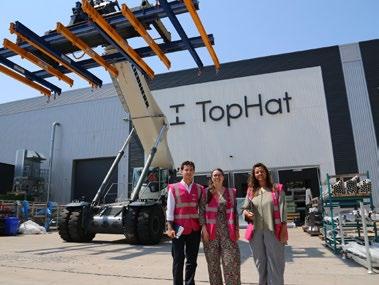
During the factory visit we were taken on a tour of the factory by Top Hat staff. During this tour we went on a journey from the raw materials, to seeing the walls, rooms, and modules coming together to form the finished product. Each step of the process gave us the opportunity to enquire about methods and materials, and understand the environmental implications. We were also able to find out more about the social aspects, such as training for staff and female representation within the team (in what is traditionally a male-dominated industry). We mapped these enquiries to the UN SDGs set by our Committee as stewardship priorities, SDG4 and SDG9.
In addition, we were able to learn more about the company itself, and how Man Group were managing the risks of contracting with a start-up company.
A positive outcome from this site visit was a deepened understanding about the environmental credentials of these innovative houses, and assurances that the manager (Man Group) were properly managing the risks. We were also able to write up this visit as a news article (https://www.wiltshirepensionfund.org.uk/ article/7878/Investing-in-Innovative-Zero-Waste-Construction) to communicate to our stakeholders that our affordable housing portfolio is helping to address the challenges faced by the housing industry and contribute towards better outcomes for both people and the planet.


The work we do to monitor our managers is both disciplined and innovative. We identify the important factors that will ensure the managers are meeting our stewardship and investment priorities and develop bespoke approaches to gain the assurance that we need.
Signatories engage with issuers to maintain or enhance the value of assets
Engagement policy
Our engagement policy is set out in our RI Policy. This explains who we engage with, and the scope of our work. Our engagement policy applies to all portfolios and all asset classes. The Fund’s relationships with the underlying holdings in the investment portfolios are set out as follows:
Where portfolios are held through the Brunel pool (currently >70% of the Fund), Brunel appoint investment managers to manage the portfolios. Where assets are still managed locally, the Fund has appointed its own investment managers, referred to as “legacy investment managers”.
As shown in the diagram, the Fund has no direct relationship with the underlying holdings in either scenario. Engagement with the underlying holdings is delegated to the legacy investment managers and Brunel, who are all provided with the Fund’s Investment Strategy Statement (including the RI Policy), so that they can ensure alignment in their approach.
The Fund’s own engagements do not currently extend to direct contact with the underlying holdings. The type of engagement work we carry out ourselves is with the managers, as described under Principle 8.
Brunel has appointed Federated Hermes EOS as the engagement and voting services provider. The appointment enables a wider coverage of assets and access to further expertise across different engagement themes. For full transparency, the Fund publishes its voting and engagement activities on its website on a quarterly basis.
Asset class: Global equities (active and Paris-aligned passive)
Company: Nestle
Engagement partner/provider: EOS
Objective: Regenerative agriculture
Date: 2023
Engagement work: An increasing number of corporations are shifting towards regenerative agriculture to mitigate their impact on land use changes and pollution, both of which are key factors contributing to the loss of biodiversity. Regenerative agriculture practices offer the potential to not only reduce but also capture carbon emissions within agricultural supply chains. EOS have been proactively engaging with Nestle to set and pursue goals related to incorporating regenerative agriculture into their supply chains. EOS have also advocated for the measurement of the impact of these practices on soil health, water quality, carbon, and biodiversity.
Outcome: Nestle now integrate regenerative agriculture as part of their overall strategy to reach net zero by 2050. The company has made a commitment to sourcing 50% of their key ingredients through regenerative agriculture by 2030.
Ongoing issues: EOS have encouraged the Nestle management team to expand this target to 100% by 2050.
Asset class: Global equities (active and Paris-aligned passive)
Company: Danone
Engagement partner/provider: EOS
Objective: Climate targets
Date: 2023
Engagement work: Danone is a French food and beverage company built around four businesses: essential dairy and plant-based products, early life nutrition, medical nutrition and waters. At the end of 2022 the company announced new climate targets, aligned with, and validated against a 1.5°C pathway, as part of the Danone impact journey.
Outcome: During engagements with the lead independent director and the sustainable finance director, EOS urged the company to ensure that it was clear how these new targets and associated strategies were being reflected in the financial statements and the audit. However, in Danone’s next annual report there was a lack of information as to how the company and its auditor had considered climate in the preparation of the accounts.
Ongoing issues: This lack of information prompted EOS to recommend a vote against the financial report and accounts at the company’s AGM in April 2023.
Asset class: Bank loans
Company: A global airline company
Engagement partner/provider: Pinebridge
Objective: Emissions reduction targets
Date: 2023
Engagement work: Pinebridge requested that in addition to the existing carbon reduction targets, if the company could disclose annual targets/milestones for lenders to track on a recurring basis.
Outcome: The company have shown willingness to consider this request.
Ongoing issues: Pinebridge will follow up to determine the progress and conviction of the company in making the requested changes.
Engagement with specific holdings is delegated to our investment managers, with whom we have communicated our priorities, and who also have freedom to pursue their own priorities depending on the characteristics of the individual holdings and/or portfolio. We review engagement activity and challenge our managers on their engagements to ensure that the approach has been effective and that our priorities have been acted on.
Signatories, where necessary, participate in collaborative engagement to influence issuers.
Our partners for collaborative engagement
We are a member of LAPFF (Local Authorities Pension Fund Forum), which enables us to act with other local authorities on corporate governance issues. LAPFF’s mission is to protect the long-term investment interests of beneficiaries by promoting the highest standards of corporate governance and corporate responsibility amongst investee companies.
CLIMATE ACTION 100+
We are a signatory of Climate Action 100. This is an investor-led initiative to ensure the world’s largest corporate greenhouse gas emitters take necessary action on climate change. This initiative enables the Fund to support engagement activities which promote the target of net zero by 2050.
More information is available here: https://www.climateaction100.org/
We engage and collaborate with other shareholder funds through the client group, the Responsible Investment Sub-Group (RISG), and ad hoc communications from Brunel on responsible investment initiatives, for example engagement and voting matters.
FEDERATED HERMES EOS
Engagement implementation at Brunel is undertaken by asset managers, our specialist provider means by which client fund investment priorities are communicated to EOS is via the RISG and directly to EOS at (RISG) meetings which are attended by the EOS engagement team.
Assessing effectiveness of collaborative engagement
It is difficult to measure the success of engagement activity, particularly on thematic issues. Changes in public opinion, policies, practice and regulation take place over the long term as the incremental effect of many smaller scale discussion, debate and decisions, diplomatic and activist actions place pressure on governments, asset owners, asset managers and issuers in turn.
Company: Home Depot
Engagement partner/provider: LAPFF
Objective: To request that the company conduct risk-based supply chain mapping, following reports that the company had alleged links to forced labour in its supply chain.
Date: Q2 2023
Engagement work: LAPFF met with the company in Dec–22 and subsequently attended the AGM in May 23 and asked a question.
Outcome: At the AGM, LAPFF asked the company if it would commit to undertaking a mapping of its supply chain in higher-risk areas such as Xinjiang, and whether it would undertake an independently led human rights impact assessment on its PVC supply chain. The company provided a general response on its supply chain due diligence but did not commit to either of LAPFF’s requests.
Ongoing issues: Alongside the other investors involved in the engagement, LAPFF will be seeking to organise another call with the company to further discuss its global supply chain due diligence with a focus on its PVC supply chain and Uyghur forced labour.
Company: Toyota
Engagement partner/provider: LAPFF via CA100+ transportation group
Objective: To seek to address risks around transition, given concerns around lobbying and plans for moving towards electric vehicles.
Date: Q2 2023
Engagement work: Letter, shareholder resolution, company meetings
Outcome: LAPFF signed on to a letter to Toyota which called on the company to align its strategy and lobbying activity to a 1.5 degree scenario. Concern about Toyota’s lobbying activity led to a shareholder resolution, calling for an annual review and report on the impact on Toyota caused by climate-related lobbying activities and the alignment of their activities with the goals of the Paris Agreement. As part of its climate voting alerts LAPFF supported the resolution.
During the quarter, LAPFF also met with the company as part of the collaborative engagement. The meeting covered proposed US regulations, capital expenditure on EVs, plans for EV production, and the challenges around battery sourcing.
Ongoing issues: LAPFF will continue to engage with Toyota, and other carmakers, to ensure that plans for EV production are aligned to a 1.5 degree pathway and also ensure alignment of public policy positions with the Paris agreement.
By joining with other investors in collaborative engagement activities, we are more effective and achieve wider reach across our investments. By monitoring the engagements carried out on our behalf, we are able to ensure that key themes are picked up and followed through.
Signatories, where necessary, escalate stewardship activities to influence issuers.
Setting engagement and escalation expectations
We have provided all managers and Brunel with our RI Policy, setting out our expectations on engagement. We expect both our managers and Brunel to take appropriate action when engaging in stewardship activities on our behalf – engagements need to be convincing, and we want our managers to escalate as needed. This may eventually lead to divestment if insufficient progress is being made. Our own engagement activities with our investment managers may also lead us to escalate issues if we do not feel that adequate progress is being made.
Our emerging markets multi-asset manager, Ninety One, has been engaging with Samsung Electronics over a long period of time, with multiple escalations. Highlights of this long-term engagement are as follows:
Company: Samsung (£8.4m holding as at Q3 2023)
Engagement priorities: Sustainability, including improved net zero target setting.
Ninety One began engaging with Samsung in 2021 on climaterelated issues, as the company is a high emitter, but had not committed to net zero or published any meaningful targets. They met with the board in Q1 2022, and then escalated the engagement via letter to the Chair of the board setting out key recommendations. In Q2 2022 responses were received agreeing that this matter was a priority.
In Q3 2022, a net zero goal was set, but the interim targets were deemed to be insufficient, and this matter was escalated via letter and a meeting with investor relations in Q4 2022 to discuss the matter and propose recommended actions.
In Q1 2023, Ninety One met with Samsung’s ESG specialists to reiterate priorities and obtain more information. In Q3 2023, another meeting was held with senior managers in the sustainability team to discuss further detail and monitor progress. During this time, positive progress was made, specifically on the priority of interim scope 1 & 2 reduction targets.
At the time of writing, Ninety One assess that the company is moving in the right direction, but more needs to be done. Samsung remains a key strategic engagement priority as one of Ninety One’s highest emitters.
Initial engagement on climate issues
2021 Q1 2022
Meeting with board and escalation letter
Q4 2022
Meeting with investor relations and escalation letter
Q1 2023
Meeting with company's ESG specialists
Q3 2023
Meeting with senior managers to assess progress
Focus on delivering further improvements
As at March 2023, we held £1.5m in Suncor Energy, via the Brunel Global High Alpha active equity portfolio. Suncor self-describe their operations as “oil sands development, production and upgrading; offshore oil and gas; petroleum refining”. This is a holding where we have questioned its appropriateness in Brunel’s portfolio for some time; we initially engaged with Brunel on Suncor’s activities in August 2021. This engagement activity involved raising concerns around the credibility of Suncor’s target-setting and ability to decarbonise and transition.
Having made enquiries with the RLAM, the underlying manager who held this company, they acknowledged that Suncor presents “significant ESG risks and high transition risks” but the rationale for maintaining Suncor in the portfolio is due to its ability to “demonstrate superior wealth creation and [is] attractively valued when this is considered. [There is a] strong investment case over next 5 to 10 years, with credible and explicit 2030 goals, which will have a significant impact on carbon reduction”.
The goals set by Suncor only apply to the act of taking the oil out of the ground, not how it is then used. Suncor's renewable energy production has consistently remained minimal, in addition to little decline in revenues from oil since 2018, it is apparent that their approach to renewables may be a symbolic gesture. We therefore maintained strong reservations about the credibility of transition plans for this company.
In April 2023, Suncor bought an oil sands operation for $4bn. These operations clearly do not align with the Fund’s net-zero ambitions, and we were unable to understand the legitimacy of the company’s decarbonisation commitments whilst actively expanding extractive operations. We again engaged, questioning the investment case and flagging concerns. This increased engagement led to a dedicated meeting in August 2023 for Brunel client funds to ask questions of the manager. We also wrote a letter on behalf of our Committee, requesting that all oil sands holdings be sold.
We have set clear expectations that the engagement work which we delegate to our investment managers needs to be focused and convincing, and this means that they are appropriately escalating engagements where progress is not fast enough. In our own engagements with our investment managers, we monitor process on an ongoing basis, escalate if necessary, and work to achieve results.
Shortly after this meeting, the manager sold Suncor, due to comments made at the Q2 2023 earnings call. While this removed the problem of this specific holding, we continue to engage on oil sands companies more widely, as we believe that these represent an unjustifiable risk to the Fund and are fundamentally misaligned with a new zero future. This includes collaborative work with other client funds, exploring options such as activity-based exclusions. Watch this space!
Initial engagement - challenge and discussion
23 Challenge at Investment Sub-Group meeting
Engagement with other partner funds on this holding
23
Met and challenged investment manager on the holding
23
Wrote a letter on behalf of the Committee requesting divestment of all oil sands ONGOING
Collaborative work to remove oil sands companies
Voting policy
Our Investment Strategy Statement sets out expectations on asset managers for exercising rights and responsibilities on our behalf: Signatories actively exercise their rights and responsibilities
The Fund believes that voting is integral part of the responsible investment and stewardship process.
For assets that have transitioned to Brunel, the Committee has delegated the exercise of voting rights to Brunel on the basis that voting power will be exercised with the objective of preserving and enhancing longterm shareholder value. As part of owning publicly listed companies, Brunel, on behalf of its clients, will have the opportunity to vote at company meetings (AGM/ EGMs). Brunel aims to vote 100% of all available votes. To provide guidance to its managers, Brunel has a single voting policy for all assets managed by Brunel in segregated accounts. Federated Hermes EOS (EOS) has been appointed to support Brunel as its engagement and voting service provider. Brunel will publish its voting policy and provide online voting records at least annually.
For listed equities still held outside the Brunel pool, voting is delegated to the investment manager for the portfolio.
We do not use default recommendations from proxy advisors. Brunel’s responsible investment policy and voting guidelines have been agreed by all clients and shareholders, so there is no process or facility to override this on a client-by-client basis. Brunel may vote on behalf of partnership funds in segregated accounts. For pooled account asset managers, the voting policy is considered as an important part of the procurement process.
We engage in securities lending through Brunel portfolios. Brunel has developed a stock lending policy which embeds a commitment to responsible investment. Specifically, where there is a perceived trade-off between the economic benefit of stock lending and Brunel’s ability to discharge its obligations as a responsible long-term investor, the latter will have precedence.
We publish our voting records online: Voting – Wiltshire Pension Fund
Transparency and information sharing
Once we receive our quarterly voting information from our investment managers, we analyse the data to ensure that managers have voted in line with expectations. For example, we will look at the number of abstentions (which we expect to be very low). We also look at analysis of where we have voted with or against management.We expect that our managers will be supportive of management to help them continue to run successful businesses, but also exert pressure on companies when it is needed.
We then review the data to select case studies – for example where a manager has voted on a climaterelated resolution, as this is one of our stewardship priorities, we will look to understand the story behind this vote. We also receive voting recommendations from LAPFF, which we provide to our managers. Where the manager has not voted in line with this recommendation, we will discuss this with them to gain an understanding.
All this review work is written up into a quarterly voting summary, which is reviewed by our Committee and published online, in order to hold our selves accountable and bring our approach to life for our stakeholders.
Exercising our rights and responsibilities for asset classes other than listed equities is something that we delegate to the relevant investment manager, with expectations set that they will act in accordance with our RI Policy. We discuss actions that they have taken on our behalf with them, both at manager selection stage and as part of ongoing assessment. Actions of the type of things that we have seen include the following examples:
• Use of ESG ratchets for private debt investments, whereby if a company achieves certain ESG milestones (e.g. setting climate targets, improvements in disclosure etc), they will see a decrease in the cost of debt. Our managers see this as a way to drive industry improvements, but also a risk management tool – companies who perform better from an ESG perspective will be more likely to survive as businesses, and therefore less likely to default on their debt.
• Use of climate-related debt covenants, whereby if certain climate milestones are met/failed (depending on the specific milestone), then a covenant is breached, which may the mean that the company is unable to pay dividends that year, or other similar penalties. This can be a very powerful tool to influence behaviour.
Annual voting summary (for the calendar year 2023)

As a member of LAPFF, we receive voting alerts, including those for climate related lobbying and carbon emission target resolutions. One of these alerts was in respect of Enbridge, an energy company held by Magellan (our listed infrastructure manager), regarding their disclosure of scope 3 emissions data. We shared the resolution recommendation with Magellan to inform their voting intentions. Magellan's own analysis of the company recommended voting against the proposal which differed from the LAPFF alert to support. Magellan highlighted how Enbridge are above their peers on reporting emissions data, and that the proponent of the vote may have missed disclosures that have already been made. On this basis, Magellan voted against the shareholder resolution. In the event, the shareholder resolution received significant support (24%), but was not carried.
EOS highlighted a particular example of concerns related to the approach to board diversity and excessive CEO pay at Netflix, Inc. Last year, some 73% of shareholders rejected the pay proposal at Netflix and we were disappointed that the company had not done more to address shareholder concerns this year. Against the backdrop of a Hollywood writers' strike, Netflix shareholders (including EOS) again withheld support for the sizable packages awarded to the content streamer's executives, voting against the resolution.
The work we do to set expectations, engage with our managers, and analyse voting data means that we are assured that our managers are acting in line with our priorities, that we are exercising our rights appropriately, and that we are using our vote to help generate positive change.
During quarterly meetings last year, we learned of Ninety One's engagement with Vale, the Brumadinho tailings dam collapse in 2019 that killed 272 people causing significant environmental damage to surrounding communities, and the company's progress in Brumadinho and reparations.
LAPFF recommended voting against resolutions on the Approval of the Financial Statements and Re-election to the Board of directors. We forwarded the alert to Ninety One, learning of the decision to vote in favour, and noted the manager comments as follows:
Ninety One's policy flagged risks that the financials "may be adjusted significantly in future periods, as new facts and circumstances become known". This is regarding estimates of costs surrounding the decommissioning of tailings dams following the Brumadinho incident. Vale has endeavoured to be transparent by sharing comprehensive expense estimates and disclosing their process and actions. Additionally, they hold an unqualified audit opinion from an independent auditor. As a result, Ninety One saw no reason to oppose their financials, and in the event this resolution was successfully passed. In Ninety One’s opinion, the proposed Board member for re-election had been instrumental in reframing the audit and risk function and been an important part of overall governance improvement at Vale, and at the meeting was successfully re-elected.

